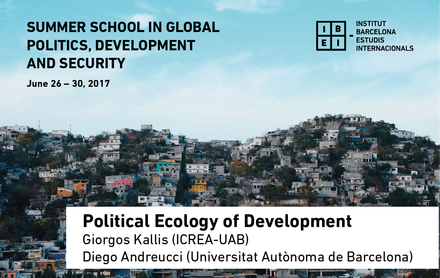Political Ecology of Development
10 hour course
Prof. Giorgos Kallis (ICREA-Universitat Autònoma de Barcelona)
Dr. Diego Andreucci (Universitat Autònoma de Barcelona)
June 26 – 30 (4.30 – 6.30 pm)
Download the syllabus
The course is an examination of the Political Ecology of Development. We will look at the interdisciplinary field of Political Ecology, the study of ecological distribution conflicts and the ways in which power affects access over resources as well as opportunities for human-centred development. Drawing from a range of approaches in Political Ecology—particularly, ecological economics, post-structuralism and neo-Marxism—we will introduce and discuss key concepts and theoretical frameworks that underlie the contemporary critique of development and growth. We will then explore these issues through analysing two empirical case studies of struggles around development and natural resource extraction in Latin America. First, drawing insights from the case of neoliberal ‘extractivism’ in Peru, we will discuss how Michel Foucault's notions of ‘biopolitics’ and ‘governmentality’ can help us to uncover the discursive mechanisms mobilised by governments and international institutions to de-politicise development and legitimise the violence necessary to sustain it. Second, by looking at the case of Bolivia under the leftist government of Evo Morales, we will reflect on the contradictions of extraction-based development in its progressive variant, and on the challenges involved in overcoming this model. Finally, we will discuss the impossibility theorem of making growth-based development compatible with environmental sustainability, and explore alternatives to economic growth.

